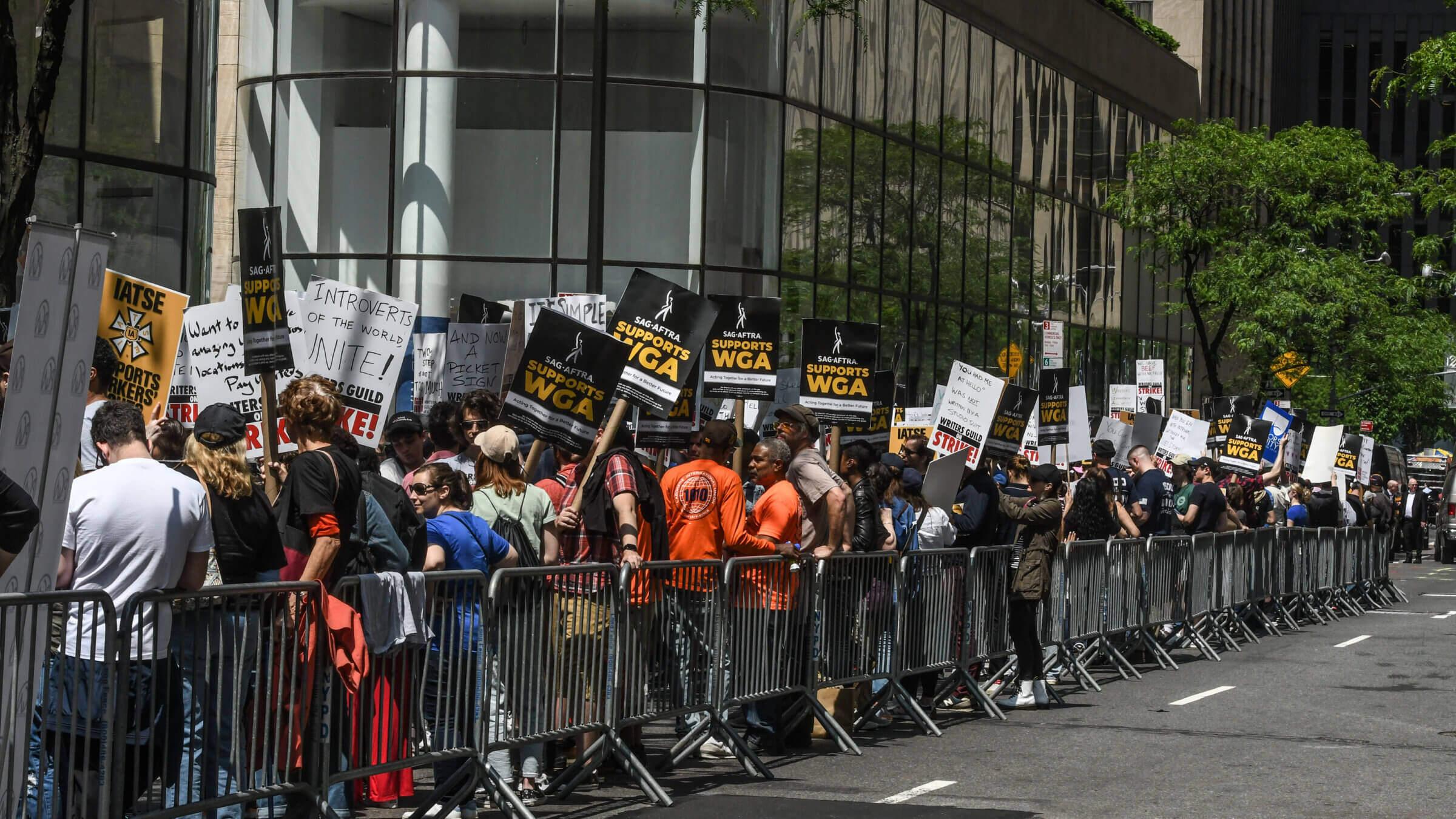I wrote comedy for Mary Tyler Moore and Carl Reiner — and I support the writers’ strike
A TV veteran who joined the guild in 1973 explains what’s at stake

Writers Guild of America members and supporters picket NBCUniversal at Rockefeller Plaza. Photo by Getty Images
As a WGA member, I was verklempt when I saw over 1,000 demonstrators and hundreds of onlookers at the recent event, “Rally at the Rock.” The street was overrun with writers, comedians, union chiefs and others there to show support. I don’t work on sitcoms anymore — my jokes are now pro-bono — but I’m emotionally grandmothered in and worry about the plight of today’s writers. I guess that makes me a comedy writer emeritus.
I joined in 1973 and was personally affected by four strikes. We picketed to get salary hikes and residual payments for movies shown on videocassettes and pay television, then for a share of producer revenues from pay-TV and home video markets, and later to get residual payments for TV shows broadcast in foreign countries.
If anything primed me to write comedy, it was growing up in a family where humor was the antidote for tsoris. Jewish jokes were as essential as two sets of dishes. The one about the woman who asks God to save her drowning grandson — after the kid is saved, she looks up at the sky and says, “He had a hat!” — was told so frequently, we should have paid royalties.
My father never tired of the one where two men in a restaurant order tea, with one telling the waiter to make sure the glass is clean, ending with the punchline, “Which one asked for the clean glass?”
Menasha Skulnik, the founder of all standups as a star of the Yiddish theater, who played Uncle David on The Goldbergs, was a family friend, the one I most adored. At our seder, he looked at the ridiculously enormous platter of brisket my mother put on the table next to him and added a fifth question, “But what’s everyone else going to have?”
I was only eight when he starred in the sitcom, Menasha the Magnificent. It lasted for only three months and though he never considered himself a TV personality, I’m sure he would have been tickled by my most unlikely career. If articles, like sitcoms, had tags, this one would read: In 1963, the Yiddish Forverts published his serialized memoir, which tracked his performances from Warsaw to Broadway.
My family provided the basic training, and my 5 ½ years as Carl Reiner’s secretary were the post-graduate program. His office was funnier than any open-mic night. Even if there weren’t enough of us to form a minyan, Aaron Ruben, who’d been one of Sid Caesar’s writers and was fluent in Yiddish, broke everyone up by reading aloud from the Forward’s advice column, “A Bintel Brief.”
Though I missed seeing familiar faces at the picket, I was thrilled by the diversity, which the guild very much encourages. Some Jews who’ve made us laugh were speaking up. Josh Gondelman, a WGA captain and strike leader in New York who wrote for the brilliantly hilarious Last Week Tonight with John Oliver, introduced the speakers.
Tony Kushner told the crowd, “A strike is costly and scary — something writers do, not because we’re greedy, but because our bosses are.”
Al Franken, speaking directly across the street from the building where he’d worked while on Saturday Night Live before he became one of my favorite senators, joked, “I don’t want to make this political, but Republicans hate unions.” That wasn’t necessarily a joke.
“It really shouldn’t be surprising to the big studios that the human beings who are creating this content, who are the beating hearts and minds of this, behind this art and content, want to be treated with basic dignity,” said Broad City star and co-creator Ilana Glazer, who credits her Jewish upbringing with informing her work.
When I worked in television, the wisdom was, “Write Yiddish, cast British.” Valerie Harper, who was Catholic, was totally convincing as the Jewish, insecure, self-effacing Rhoda on The Mary Tyler Moore Show. At the rally, a joke I’d given to Rhoda in an episode I’d written for that series came to mind. After only one date with her boss, she fantasized, “I can see the invitations now: ‘Mr. and Mrs. Martin Morgenstern are relieved to announce the marriage of their daughter Rhoda to Douglas Hemple, who’s not nearly good enough for her.’”
It’s said that when you die, you see your life pass before you. And a recent study published in Frontiers in Aging Neuroscience suggests it may be true. I seemed to be experiencing something similar: jokes I’d put into scripts kept popping into my head. Maybe the gathering was serving as a memorial for my scriptwriting career.
I understand why 98% of the 11,500-member guild voted to strike. The median weekly writer-producer salary has declined 23% when adjusted for inflation over the last decade. Film writers, too, are earning less. Many of those writing the shows are having trouble paying their rent while Hollywood studio CEOs continue to make a fortune.
It’s not just the writers who will be affected by how this strike ultimately resolves. It will impact all of us. We all want scripts written by intelligent human beings and not artificial intelligence, which my parents would have called “falshe saichel” (fake wisdom). I don’t need skin in the game to feel grateful for the solidarity and profoundly concerned about the outcome.
















